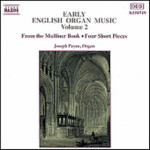
Early English Organ Music Volume 2
 $25.00
Out of Stock
$25.00
Out of Stock6+ weeks add to cart
VARIOUS COMPOSERS
Early English Organ Music Volume 2
Joseph Payne (Organ)
[ Naxos / CD ]
Release Date: Saturday 22 December 2007
This item is currently out of stock. It may take 6 or more weeks to obtain from when you place your order as this is a specialist product.
"An intriguing disc, very well played and recorded"
- The Organist (UK)
European organ music, as it has been handed down in some form of instrumental notation, might have begun in England, since the earliest known source to contain keyboard music in tablature dates from the 14th century - the Robertsbridge Codex of 1325-50. Like much English music, the keyboard repertory developed separately from that of the Continent, not only because of geographic reasons, but due to religious considerations, and the instruments themselves were subject to the sinuous events of English political upheaval. At times the effects were disastrous: church organs virtually disappeared during the Commonwealth. They were destroyed or sold for the price of the metal they contained. Indeed, all musical activity suffered the repercussions and tyranny of an intransigent religion.
Because there are enormous gaps in documented information and very few old English organs that remain, no comprehensive history of the English organ has yet been published. But it is clear that from the earliest times onward the organ was accorded prominent status. Most large churches had two organs, one of which was placed in the chancel, the other on the rood-screen. Up to the Reformation, the English organist, like his continental colleague, performed parts of the Ordinary of the mass and alternatim with the choir, that is, alternating with a chorus that performs a plainsong those portions not composed for organ.
This practice, however, is not common in one of the most important sources of early organ music, The Mulliner Book, dating from before 1560. A unique collection of largely liturgical pieces, it is the sole source for most of its contents. Obviously, it served less as a liturgical "workbook" for the London organist who compiled it, than as a body of haphazardly collected material for his own private amusement. It includes arrangements of English and foreign part-songs as well as post-Reformation plainsong settings. Many of its works attain considerable length, in which the accompaniment and style are varied with I restatements of the cantus firmus. In this form, they are no longer strictly liturgical.
Tracks:
Thomas Tallis
The Mulliner Book: Remember not, O Lord
John Redford
The Mulliner Book: Christe qui lux with a meane
William Shelbye
The Mulliner Book: Miserere
John Redford
The Mulliner Book: Veni redemptor
The Mulliner Book: Versus
The Mulliner Book: Tu ad liberandum
The Mulliner Book: Salvator with a meane
John Blitheman
The Mulliner Book: Christe redemptor omnium
Christopher Tye
The Mulliner Book: When that the fifty day was come
and much more

